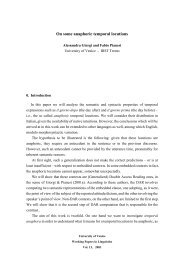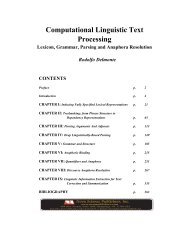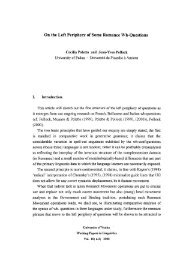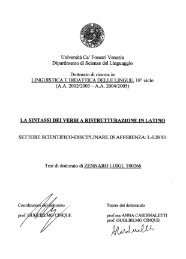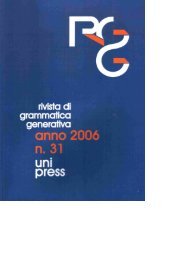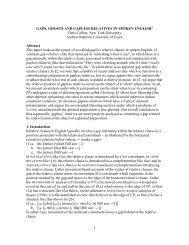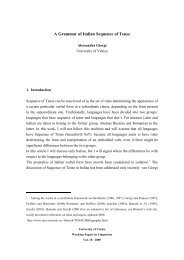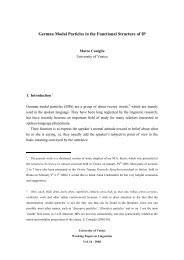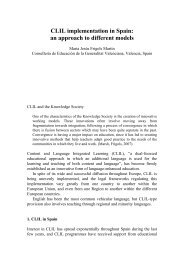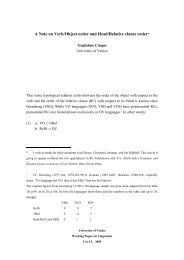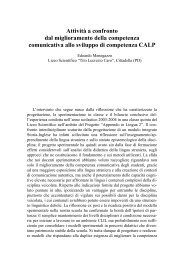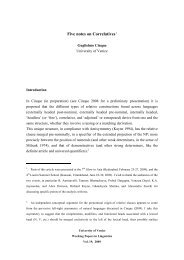Earliness Principle - Lear
Earliness Principle - Lear
Earliness Principle - Lear
Create successful ePaper yourself
Turn your PDF publications into a flip-book with our unique Google optimized e-Paper software.
-14-<br />
via the SPEC-Head relation. The A-bar chain containing who ____ receives Case; hence no do-support __<br />
is needed. 16 The Last Resort character of do-support __ ensures that do-support __ applies only here.<br />
(44)a. [ IP Who [ I e] [ VP t i left]]?<br />
b. *[ Who [ did] [ t leave]]?<br />
IP I VP i<br />
Finally, in embedded questions, which are CPs, the subject can Raise to (SPEC,IP), so<br />
that there is no problem with nominative Case assignment in the normal fashion, and do __ is not<br />
needed.<br />
Actually, something more needs to be said, given that we are deriving the “Last Resort”<br />
character of do __ Insertion from the <strong>Earliness</strong> <strong>Principle</strong>, rather than from any “Last Resort <strong>Principle</strong>”<br />
as such. In fact, <strong>Earliness</strong> as developed so far require INFL Lowering in examples like (44)b,<br />
thereby preventing Do ___ Insertion and incorrrectly allowing no grammatical output. W e must thus<br />
revise the notion of “satisfies” in (9)-(10) so that Lasnik’s Filter is not satisfied until the Subject<br />
which is to be Case-marked by INFL is also legal with respect to all grammatical principles. I will<br />
not spell out this revision here [i.e. in this draft], but it will involve a generalization of the notion of<br />
“chain” presented there such that if INFL is to assign nominative Case to the subject, the two<br />
elements must form a chain. 17<br />
There is thus a plausible account of Question Inversion that does not interfere with our<br />
account of C-Inv, and brings with it certain advantages of its own. 18 The crucial point is that if<br />
matrix Question Inversion is not an instance of I-to-C, then the availability of do __ in questions is not<br />
a problem for do-inertness. __ Recall in turn that our whole discussion of do-inertness __ is an argument<br />
for LP-structure, which in turn is a crucial part of our <strong>Earliness</strong> hypothesis.<br />
2.2 Argument #2 for the Innertness of do: __ Adverbs<br />
I assume that adverbs are generated as right or left sisters of XP or X’, depending on<br />
the nature of the adverb. Emonds has argued that V-movement can move a verb leftward to INFL<br />
over an adverb, yielding V _________ Adv NP order, as in (45):<br />
(45) Pierre parle i a`<br />
peine t i l’italien.<br />
P ollock<br />
added the important observation that movement over an adverb does not<br />
necessarily diagnose V-to-I, but could diagnose V movement to a position between V and INFL<br />
which he called “AGR”. I shall call this position, not AGR, but µ. _ I will be arguing later that µ is<br />
not an agreement element at all, but is, in fact, contentless (or, perhaps, an empty verb). P ollock’s<br />
evidence for the existence of the µ-position comes from French infinitives. French infinitives do<br />
not allow θ-assigners to move all the way to INFL, but do allow them to move “half-way” to µ over<br />
an adverbial, as seen in (46a-b):<br />
(46)a. [ IP PRO I [ µ parler i ] [ VP a peine [ VP t i l’italien]]]…<br />
b. *[ PRO [ (ne) parler ] [ pas [ t l’italien]]]…<br />
IP I i NegP VP i<br />
Now let us add a new observation: leftward movement over an adverb in English is<br />
possible for almost every verbal element in IP — not merely for the main verb:



